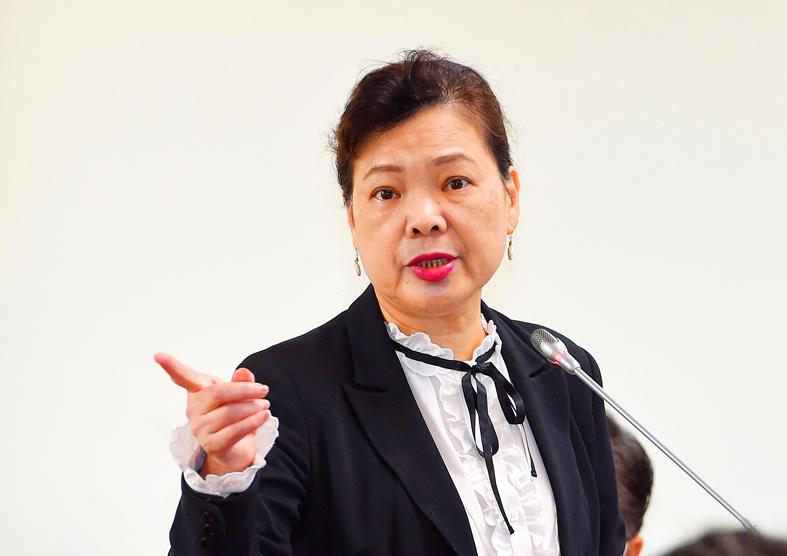Taiwan Semiconductor Manufacturing Co’s (TSMC, 台積電) most advanced technology would stay in Taiwan, Minister of Economic Affairs Wang Mei-hua (王美花) said yesterday in response to lawmakers’ queries on talks between the manufacturer and the EU.
“Regardless whether TSMC establishes production facilities or pursues cooperation in Europe, Taiwan will remain the home base for its most advanced technologies,” Wang told a joint meeting of the legislature’s Economics Committee, and Judiciary and Organic Laws and Statutes Committee.
Reuters yesterday reported that EU Commissioner for Internal Market Thierry Breton is seeking to court TSMC and other global semiconductor giants to establish chipmaking facilities in Europe.

Photo: Liu Hsin-de, Taipei Times
Tomorrow, Breton is scheduled to hold a videoconference with TSMC Europe president Maria Marced and a meeting with Intel Cop chief executive officer Pat Gelsinger in Brussels, Reuters said.
Wang played down the suggestion that TSMC might partner with the EU in its efforts to reach “chip sovereignty” with advanced nodes.
“TSMC will have to decide its global strategy and take commercial considerations into account when it comes to whether it establishes a plant in the EU,” she said.
A worldwide semiconductor shortage, which according to TSMC might persist until next year, has raised awareness of Taiwan’s pivotal role in chip supply chains.
Separately, Deputy Minister of Economic Affairs Chen Chern-chyi (陳正祺) yesterday announced that the second round of the Taiwan-US Economic Prosperity Partnership Dialogue would be held this summer.
“It’s an opportunity to foster mutual development, get on the same page in terms of trade policy and explore opportunities for cooperation,” Chen said.
The official date has not yet been announced, nor has the details of how the dialog is to be held.
During the first round of the talks in November last year, Chen led Taiwan’s delegation, while the US delegation was led by then-US undersecretary of state for economic growth, energy and the environment Keith Krach.

MULTIFACETED: A task force has analyzed possible scenarios and created responses to assist domestic industries in dealing with US tariffs, the economics minister said The Executive Yuan is tomorrow to announce countermeasures to US President Donald Trump’s planned reciprocal tariffs, although the details of the plan would not be made public until Monday next week, Minister of Economic Affairs J.W. Kuo (郭智輝) said yesterday. The Cabinet established an economic and trade task force in November last year to deal with US trade and tariff related issues, Kuo told reporters outside the legislature in Taipei. The task force has been analyzing and evaluating all kinds of scenarios to identify suitable responses and determine how best to assist domestic industries in managing the effects of Trump’s tariffs, he

TIGHT-LIPPED: UMC said it had no merger plans at the moment, after Nikkei Asia reported that the firm and GlobalFoundries were considering restarting merger talks United Microelectronics Corp (UMC, 聯電), the world’s No. 4 contract chipmaker, yesterday launched a new US$5 billion 12-inch chip factory in Singapore as part of its latest effort to diversify its manufacturing footprint amid growing geopolitical risks. The new factory, adjacent to UMC’s existing Singapore fab in the Pasir Res Wafer Fab Park, is scheduled to enter volume production next year, utilizing mature 22-nanometer and 28-nanometer process technologies, UMC said in a statement. The company plans to invest US$5 billion during the first phase of the new fab, which would have an installed capacity of 30,000 12-inch wafers per month, it said. The

Taiwan’s official purchasing managers’ index (PMI) last month rose 0.2 percentage points to 54.2, in a second consecutive month of expansion, thanks to front-loading demand intended to avoid potential US tariff hikes, the Chung-Hua Institution for Economic Research (CIER, 中華經濟研究院) said yesterday. While short-term demand appeared robust, uncertainties rose due to US President Donald Trump’s unpredictable trade policy, CIER president Lien Hsien-ming (連賢明) told a news conference in Taipei. Taiwan’s economy this year would be characterized by high-level fluctuations and the volatility would be wilder than most expect, Lien said Demand for electronics, particularly semiconductors, continues to benefit from US technology giants’ effort

‘SWASTICAR’: Tesla CEO Elon Musk’s close association with Donald Trump has prompted opponents to brand him a ‘Nazi’ and resulted in a dramatic drop in sales Demonstrators descended on Tesla Inc dealerships across the US, and in Europe and Canada on Saturday to protest company chief Elon Musk, who has amassed extraordinary power as a top adviser to US President Donald Trump. Waving signs with messages such as “Musk is stealing our money” and “Reclaim our country,” the protests largely took place peacefully following fiery episodes of vandalism on Tesla vehicles, dealerships and other facilities in recent weeks that US officials have denounced as terrorism. Hundreds rallied on Saturday outside the Tesla dealership in Manhattan. Some blasted Musk, the world’s richest man, while others demanded the shuttering of his